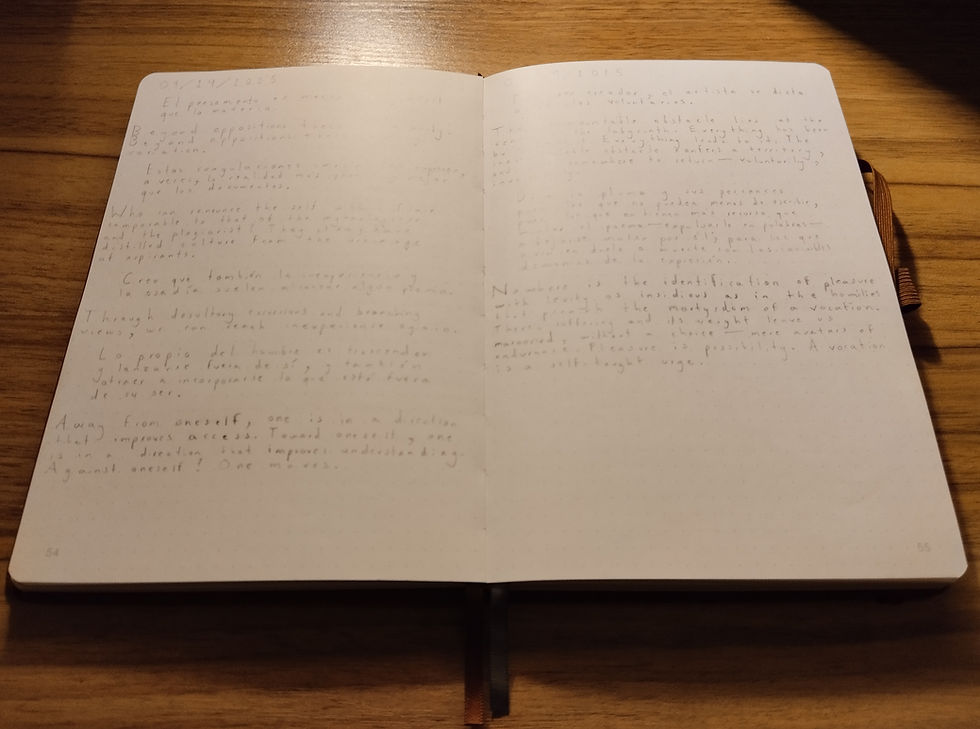Boreas
- Israel Bonilla
- Sep 24, 2022
- 3 min read
Updated: Jan 2

She focuses on the discreet dance of her blue drapery—on the rhythmic folding and unfolding, on the interspersed hints of evanescent figures, on the play of light and shadow, on the odd thread that calls attention to the wind’s greater effect. It is clear that the grace of the whole relies on the frantic workings of its minuscule parts.
In an instant, the drapery is violently let loose. She cannot even attempt to grab it. A thin branch stops what would have been a long voyage. She pulls gently and wraps the soft blue around her neck, covering her shoulders. At a distance, she hears the river’s workmanlike run.
Home is the word that every other thing seems to allude to. Or, at least, her mind has fixated upon it and willingly grants entrance to the mildest of suggestions. Be it a leaf falling close to a tree, or a worm lurking the river bed, she thinks of a correspondence. And what is home but the zenith of correspondence? She is not sure whether it is something that simply happens. Perhaps that particular worm found its place fortuitously; perhaps there are other worms that were left on a trodden path, always close to death. But this is unconvincing. She knows of no thing besides herself that does not seem at home. Those apparently luckless worms could have a marching infantry near them and yet writhe in joy. Is it, then, an insensible adaptation? She can respond only with a resounding no. As far back as she is able to recall, collecting flowers had been her refuge, and a playground for her obsession. Every improvised garden stood as proof of improbable harmony. Where else could she find the pale beauty of a foamflower raising, by contrast, the many-hued beauty of a butterfly weed? She was bolstered by the knowledge of her intervention. Her capricious alignments brought forth a splendor seemingly alien to nature.
She had hoped that life could be a protracted love for a single thing—a gradual discovery of secret abundance. Hope extended, however, always devolves into melancholy. It is poison if fulfillment straggles. The idea of home altered in her mind; it began to point inward, a mere nudge.
The lavish tints steadily became ever-increasing reminders of her rootless industry; they lost their soothing overtones. She could have left it all as it was. What difference had she made? The arrowhead glowed in its stillness amid sludge. The Solomon's seal dignified the bare surroundings with its triumphant files of white. The bellwort’s mournful petals bred spontaneous contrasts with ease. All in all, her part was redundant.
Lacking her outward prop, she was hurt into a speculative turn of mind.
The nudge is now a jolt. So she wanders.
What did she think about when she started with the flowers? She is not sure. But she suspects it was not related to her. Yes, refuge garbles her original purpose in collecting flowers. Purpose itself is a deceitful word. She simply picked a rose and enjoyed the possibilities.
When did she become obsessed with home? This question also makes her hesitate. The idea might have arrived the moment she tended her gardens in a more organized form: when the movements of her hands unexpectedly turned wilful, calculated. She was now a gardener, not a child or a woman. Her inquiring eye amazed at the abrupt sight of coordination. And the gardener stepped aside for the beggar of variety to enter. Was inwardness not predictable then?
Suddenly, the sound of the river interrupts her reverie. She is near the river bed. She calmly approaches the water. She unwraps her blue drapery and releases it. Before she has an opportunity to see the new dance, she lets herself fall.
Her eyes immediately meet with the sky. It is cloudless. A lone bird—she cannot name it—flies in a semicircle, oblivious to the manner in which the sun accents its eclectic colors.
The water is cold; she can feel how her body accustoms itself at a leisurely pace. The current carries her away. And its unceasing sound seems to carry away with it all her thoughts. She still gazes at the sky. It is vast and welcoming.



Comments